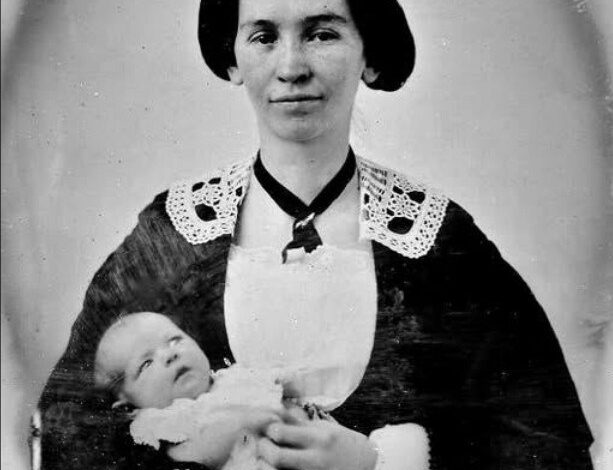She Rode Through Death to Save Her Newborn — The True Meaning of a Mother’s Love

She didn’t scream. There was no room for that.
Grief would have to wait. Tears would have to wait.
The world was demanding a decision — right now.
With her husband lying still in the snow behind her, and her newborn’s heartbeat fluttering like a dying candle against her chest, she made the choice that would define her entire life.
Wyoming Territory, January 1878.
The sky was white, the ground was white, the world was white — everything swallowed by a storm that erased the horizon and mercy with it.
Catherine “Kate” Morrison watched her husband’s chest rise once more… and fall for the very last time.
She leaned forward, placed her forehead against his, and whispered a sound that was not quite a word, not quite a sob — the sound of a soul splitting open.
The storm did not stop to acknowledge it.
It simply howled.
Her son, only six days old, cried against her skin — a small, desperate sound that pierced deeper than any wind.
He was still alive.
That meant she did not get to die today.
She wrapped him in everything they owned — her husband’s coat, her own shawl, every scrap of warmth she could find — until he was nothing but a small bundle pressed against her heartbeat. She tied him to her chest with leather straps because if she fainted… she needed him to remain against her, where her body heat could still reach him.
She kissed her husband once.
Once.
Just once.
Because if she kissed him twice, she might never leave.
Then she climbed onto the horse.
The cold was not just cold — it was a predator.
It clawed at her lungs.
It bit her fingertips.
It stole her breath and her thoughts and the edges of her memory.
Snow blinded her.
Wind mocked her.
The horizon was gone — there was only white and the beat of the horse beneath her and the tiny, fading flutter of her baby’s heart.
An hour passed.
Maybe two.
Time dissolved.
And then — the crying stopped.
The silence was worse than death.
She pressed her hand to his chest, through the layers, searching, searching, begging —
There. There. A flutter. A faint spark.
He was still with her.
Barely.
Her voice cracked as she spoke into the storm:
“Stay, Jacob. Stay. I don’t care if you hate me for the cold. Just stay.”
Her lips were bleeding.
Her fingers were numb wood.
Her vision blurred.
And then — shapes moved in the white.
A hallucination, she thought. Or God. Or madness.
But it was real.
A line shack.
Small. Weather-beaten. Half-buried — but standing.
She fell more than dismounted.
Shoved the door open with her shoulder.
Collapsed inside with her baby still tied to her chest.
She built the fire with hands she could not feel.
Melted snow in a tin pot.
Unwrapped her baby with a prayer and a terror too large for words.
Jacob was blue.
Silent.
Not breathing.
Something inside her shattered — and then ignited.
She pressed him to her bare skin, rocked him, whispered her husband’s name, her own name, her child’s name — as if names could pull souls back into bodies.
She breathed her warmth into him.
Over and over and over.
“Come back to me.”
“Come back to me.”
“Please. I am not done loving you yet.”
And then it happened —
A gasp.
A cough.
The tiniest cry — weak, angry, alive.
She broke.
She sobbed.
She laughed.
She held him as though the world itself had been returned to her arms.
Two days later, soldiers found them.
Kate had fever.
Shaking.
Barely conscious.
But her son —
Her son was warm.
Pink.
Nursing.
Living.
They called it a miracle.
But Kate knew better.
It wasn’t a miracle.
It was a thousand choices made every step through the snow:
One more breath. One more heartbeat. One more inch forward.
Jacob Morrison grew up to become a doctor — because he had learned, with every breath of his life, that survival is something someone fights for.
And when he told his children about the grandmother they never knew, he didn’t speak of heroism or legend.
He said:
“My mother rode through death itself because I was worth saving.”
Because love is not soft.
Love is not fragile.
Love is a warhorse ridden through a blizzard.
And when the world comes for what we love —
we do not beg.
We rise.